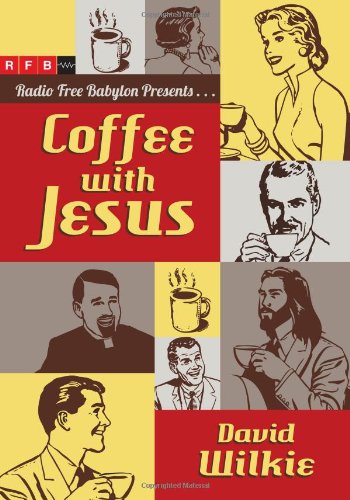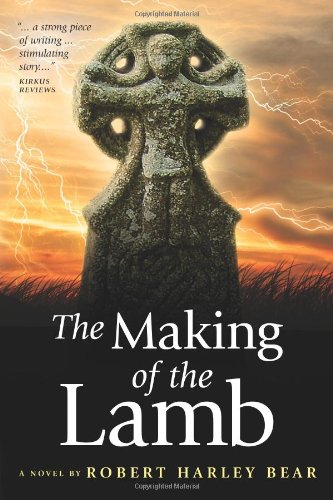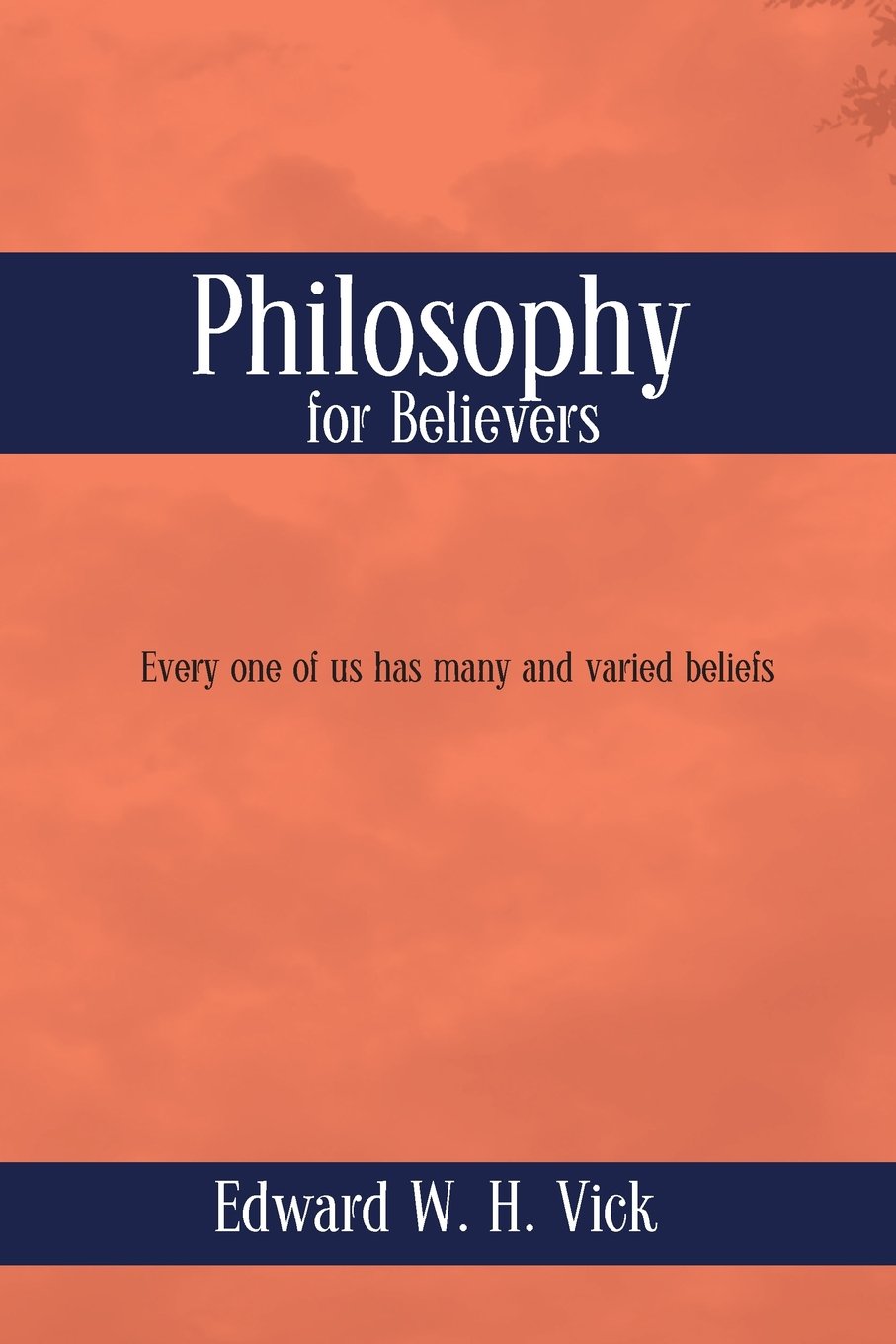Book review: Coffee with Jesus
by David Wilkie
★★★★
Coffee with Jesus isn’t your everyday comic book. You think it’s easy putting words on the lips of Jesus, while avoiding the sacrilegious? I get the feeling that Wilkie toned it down just a little to take the edge off. He could have been much more pointed. Yet it really is as amusing as it is serious how Jesus pokes holes in our religiosity, just sipping coffee and offering advice. Jesus’ gentle sarcasm hits the mark time after time.
It’s a great book, but I have to point out a couple negatives. The print is small, and the same artwork is repeated throughout. I’m guessing there are maybe a dozen unique frames throughout the book, which differ only in the words printed underneath the character drawings. Whenever Joe, the Pastor, turns to look to the right, the part in his hair magically shifts to his left side … the wonders of mirror imaging. Obviously, you’re not buying the book for physical humor or captivating artwork. This format works well for a daily publication; not so much for a book, where the repetitiveness may begin to wear on you.
Artwork aside, though, you’ll fall in love with the personalities and their many character flaws. How like you and me they are, and how patient Jesus is with each of them! Definitely a feel-good book, whether or not Wilkie meant it to be!

Ezekiel 37:13-14, The Spirit’s Arrival and the End of Time
And ye shall know that I am the LORD, when I have opened your graves, O my people, and brought you up out of your graves, And shall put my spirit in you, and ye shall live.
//Ezekiel, here, didn’t appear to be talking about a literal resurrection. His vision of the resurrection of dry bones relates to restoring the people of Israel back to their homeland. However, this verse in time began to play a role in eschatological dreams (For Jews, that means expectations about the coming age of their promised Messiah–some would say, the end of the world and the beginning of a new world.)
Ezekiel’s promise of a life-giving spirit became an expectation of a gift from God in the messianic age. In that day, God would rule justly, and the world would be set right. We see this hope not only in Christian writings, but other Jewish writings as well, such as in the Dead Sea Scrolls. In Jubilees 1:23, God promises “I shall create for them a holy spirit, and I shall purify them so that they will not turn away from following me from that day and forever.” Today, Christians call this gift the Holy Spirit (the third part of the Trinity) and believe the delivery of the Spirit happened 40 days after Jesus resurrected, on Pentecost.
This is a little confusing to many, because if the Spirit’s arrival is meant to signal the beginning of the age of God’s rule, wouldn’t that mean the millennium has begun? Are we, or are we not, living in the messianic age? Where are all the resurrected people?
Paul seemed confused as well. In too many verses for me to quote, Paul indicates that we are a new creation, infused with the promised Spirit, and thus the age has begun. Paul seemed to live his life in fervent desperation, carrying the message of Jesus to the ends of the earth, knowing that any minute, the resurrection would occur. How could it not, if the Spirit has arrived? Read again today’s verse in Ezekiel.
So where did Paul err? Was Paul wrong that there would be a resurrection, or was he wrong when he claimed the Spirit had arrived, or was he wrong to tie the two events together?
Revelation 22:19, The Covenant of Revelation
And if any man shall take away from the words of the book of this prophecy, God shall take away his part out of the book of life, and out of the holy city, and from the things which are written in this book.
//This verse appears at the very end of our Bible, warning us not to tinker with any of the words in the book of Revelation. This threat surely doesn’t refer to the Bible as a whole, but to the covenant of Revelation … a covenant of a new heaven and new earth to come.
Yes, I said “covenant.” Revelation is more than a book of promises. It purposefully closes in covenantal language. Whether or not you believe everything in Revelation will come to pass in a literal manner, its author (somebody named John) claims a direct message from Jesus and frames this message as a covenant.
Compare the language of today’s verse, for example, with the covenant in Deuteronomy 4:2:
Ye shall not add unto the word which I command you, neither shall ye diminish ought from it, that ye may keep the commandments of the LORD your God which I command you.
It is now firmly established by scholars that the structure of the Mosaic covenant–particularly as written in Deuteronomy and the Decalogue–reflects a common structure of established covenants of that day. Here’s another example, from the Hittite treaty of Tudhaliyas IV and Ulmi-Teshub:
Whoever … changes but one word of this tablet … may the thousand gods of this tablet root that man’s descendants out of the land of Hatti –Kline, Structure of Biblical Authority, p. 29
The logical conclusion is that Revelation was intended as divine scripture, a covenant between Jesus and his followers.
Matthew 26:57, The Unlikely Trial
And they that had laid hold on Jesus led him away to Caiaphas the high priest, where the scribes and the elders were assembled.
//In the Gospel of John, there is no trial of Jesus before the Sanhedrin (the ruling council of the Jews). But the other three gospels tell of this trial, a sort of kangaroo court, in which Jesus is condemned by the Jews prior to turning him over to the Romans.
One wonders how this could be true. The likelihood of Caiaphas (the high priest) sending messengers around Jerusalem, gathering the 71 members of the Sanhedrin for a hurried assembly, seems remote. But this is the least of the problems. The story told by the Synoptic gospels simply doesn’t jive with Jewish law … at least, not according to the Mishnah.
1. The Sanhedrin is not permitted to meet at night.
2. The Sanhedrin is not permitted to meet during Passover.
3. The Sanhedrin is not permitted to meet casually in public, like the courtyard.
4. The trial must begin with a detailed list of accusations.
John’s version of the story, which includes none of the above, seems far more likely.
Matthew 7:14, Who Shall Be Saved?
Because strait is the gate, and narrow is the way, which leadeth unto life, and few there be that find it.
//Who will be saved? Just how strait is this gate? This is far too great a topic for a simple answer, but it’s a question that lends itself well to the spirit of my blog: that is, raising questions for contemplation. Consider these two contradictory verses:
For whosoever shall call upon the name of the Lord shall be saved. –Romans 10:13
Not every one that saith unto me, Lord, Lord, shall enter into the kingdom of heaven; but he that doeth the will of my Father which is in heaven. –Matthew 7:21
Paul seems to indicate that salvation is available to all who “call upon the name of the Lord”–believe and you’re saved–but Matthew, repeating the words of Jesus, insists this is not so. Matthew warns strenuously about “false prophets” in the world. No, it’s not enough to just call on Jesus. One must actually do something. One must do what God commands. The kingdom of heaven is reserved for “whosoever heareth these sayings of mine and doeth them.”
And what must we do, according to Matthew? It turns out that this verse concludes the Sermon on the Mount–Matthew 5, 6 and 7–with its instruction for mercy, for carrying a light, for loving your enemy, and much more. Few there be who enter into this gate.
Book review: The Making of the Lamb
by Robert Harley Bear
★★★★
What really happened during Jesus’ “lost years” between his appearance at the Temple at age 12 and his ministry at about age 30? Did he grow up in Egypt? India? Or working with his father as a carpenter in Tiberias?
Bear’s story builds upon a medieval legend of Jesus visiting Britain, perhaps under the care of Joseph of Arimathea, who was in some versions of the legend Jesus’ great uncle and a tin merchant. Maybe you’ve read Gordon Strachan’s Jesus the Master Builder: Druid Mysteries and the Dawn of Christianity. Strachan takes these legends seriously, painting Jesus as a Druid.
Bear’s rendition doesn’t go that far. It is presented as fiction based on legend, but Bear’s research is exhaustive. Bear spins a tale of Jesus’ coming-of-age years based on the legend that encourages the reader to come to his or her own conclusions on how the cornerstone ideas of the Christian faith originated in the One we’ve accepted as Lord. The book is lightly tinged with pluralism, yet in all ways respectful of Christian beliefs; I’ve no reason to believe Bear isn’t a practicing Christian. His book brings myth and legend alive with meaning, speculating about how Jesus slowly began to piece together his mission in life. It’s also a well-researched glimpse into Roman oppression throughout the land, setting the scene for Jesus’ pacifistic opposition to the Empire.
In the story, Jesus develops a special relationship with the Father from a young age, but the Father’s ways are mysterious. Jesus contemplates his role as savior of the world and how the Father’s vision of the Messiah differs from the warrior figure Jesus envisioned; he learns what it means to be born again of the Spirit; he learns how to forgive and how to respect our differences. In short, readers of Bear’s novel witness the Making of the Lamb…the one who gave up his sword to die on the cross.
It’s a fascinating journey worth taking with the young Jesus. A book you won’t soon forget.

Exodus 19:4, On Eagles’ Wings
You yourselves have seen what I did to Egypt, and how I carried you on eagles’ wings and brought you to myself.
//What a glorious picture this is, of God saving his people on the wings of an eagle! Does it change the picture if the word eagle–Hebrew nesher–is probably not an eagle at all, but a vulture? Note that the same Hebrew word nesher is translated differently in this verse:
The eye that mocks a father, that scorns an aged mother, will be pecked out by the ravens of the valley, will be eaten by the vultures.–Proverbs 30:17
Most scholars agree, a more precise translation is “vulture.” A couple more samples:
Those who hope in the LORD will renew their strength. They will soar on wings like vultures; they will run and not grow weary, they will walk and not be faint. –Isaiah 40:31
He shielded him and cared for him; he guarded him as the apple of his eye, like a vulture that stirs up its nest and hovers over its young, that spreads its wings to catch them and carries them aloft. –Deuteronomy 32:10-11
Job 29:10, The Humbling of Job
The voices of the nobles were hushed, and their tongues stuck to the roof of their mouths.
//Job, says the Bible, was the greatest, richest man of his time. And he seemed quite aware of his greatness. Someday, take a glance at chapter 29. You’ll find a Job you may not recognize.
In this chapter, Job bemoans his fall from grace, and wishes for the old days. He used to be so much greater than everyone else that as he walked down the street the crowds parted for him. Noblemen fell into a hushed silence as he strolled by. When he took his place in the public square, even the old men stood to their feet. Everyone drank up his words like rain, and cherished each of his smiles.
What did Job think of these adoring peons? Read on into the next chapter. They bray like disreputable animals. Their fathers Job disdained, for they did not deserve the company of dogs.
And now, after Job is brought low, the people mock Job instead of worship him. Poor Job.
Perhaps Job’s strongest quality was not his patience but his pride? Perhaps there was more reason than we think for this humbling act of God, bringing Job down to ashes?
Book review: Philosophy for Believers
by Edward W. H. Vick
★★★★
This is an introductory philosophy text, complete with worksheets, focusing primarily on the subject of the nature of truth and how we know something to be true. What makes this text unique is that it chooses Christianity for its playground.
Do not assume an argument will be presented justifying Christian belief. Apologetics is not the focus at all. The exercises and examples often relate to Christian thinking, but you’ll find little resolution. In fact, the discussion seems to meander around several philosophy topics without ever zeroing in on any solid answers. The point is to introduce the philosophy of examining truth.
Along the way, you’ll discuss what is means to believe, the nature of religious belief, how God is experienced, providence, cause and effect, dualism, even miracles and the afterlife. Finally, Vick touches on the friction between science and faith, and the role of both. It’s an appropriate finish, and the book closes with an enigmatic discovery: “One cannot reasonably claim that knowledge results only from one kind of experience, or only from one method of understanding the world.” In other words, science and faith should cooperate in the search for truth.
My favorite section was a discussion of self-deception. Is such a thing even possible? This topic borders on the psychological. Does anyone ever really hold contradictory beliefs, or does one simply refuse to acknowledge the contradiction?
I can’t say this book is what I expected, but I did enjoy the study!

John 2:19-21, Living Water, Part II of II
Jesus answered and said unto them, Destroy this temple, and in three days I will raise it up. Then said the Jews, Forty and six years was this temple in building, and wilt thou rear it up in three days? But he spake of the temple of his body.
//Yesterday, I discussed a vision Ezekiel had of the new City of God. In the center of the City was a temple, and flowing from the temple was a river that spread life to everything it touched. When these living waters reached the Dead Sea, even this salty sea was transformed into an abundance of living fish.
Are we supposed to take this vision literally? Will this really happen as depicted? Perhaps it has already happened?
The book of Revelation appears to contradict Ezekiel when it says that in the new city there will be no temple. Revelation explains that Jesus himself is the temple. Does this dash the hope of living water?
Nope. Whatever it is that Ezekiel imagined, the Gospel of John explains how it came to be. John’s Gospel, in today’s verse, tells how the new temple was raised in the new City of God. When Jesus spoke of a new temple being built, he was talking about his own resurrection. Just like Revelation promised, Jesus became the temple.
But what of Ezekiel’s promise of living water flowing from the temple … first a small stream, then rivers of life-giving water? Jesus explains this as well:
He that believeth on me, as the scripture hath said, out of his belly shall flow rivers of living water. –John 7:38
Thus this living water continues to flow out from the “temple” today, bringing life to everything it touches in the world. Ezekiel was right.
















 354 Circles
354 Circles
 603 Goodreads Friends & Fans
603 Goodreads Friends & Fans

 Hello! I'm an author, historical Jesus scholar, book reviewer, and liberal Christian, which means I appreciate and attempt to exercise the humanitarian teachings of Jesus without getting hung up on any particular supernatural or religious beliefs.
The Bible is a magnificent book that has inspired and spiritually fed generations for thousands of years, and each new century seems to bring a deeper understanding of life’s purpose. This is true of not only Christianity; through the years, our age-old religions are slowly transforming from superstitious rituals into humanitarian philosophies. In short, we are growing up, and I am thrilled to be riding the wave.
I avidly read all thought-provoking religion titles. New authors: I'd love to read and review your book!
Hello! I'm an author, historical Jesus scholar, book reviewer, and liberal Christian, which means I appreciate and attempt to exercise the humanitarian teachings of Jesus without getting hung up on any particular supernatural or religious beliefs.
The Bible is a magnificent book that has inspired and spiritually fed generations for thousands of years, and each new century seems to bring a deeper understanding of life’s purpose. This is true of not only Christianity; through the years, our age-old religions are slowly transforming from superstitious rituals into humanitarian philosophies. In short, we are growing up, and I am thrilled to be riding the wave.
I avidly read all thought-provoking religion titles. New authors: I'd love to read and review your book!
 Hi! While Lee writes the articles and reviews the books, I edit, organize, and maintain the blog. The views expressed here are Lee's but I'm his biggest supporter! :-)
Hi! While Lee writes the articles and reviews the books, I edit, organize, and maintain the blog. The views expressed here are Lee's but I'm his biggest supporter! :-)
Connect With Me!